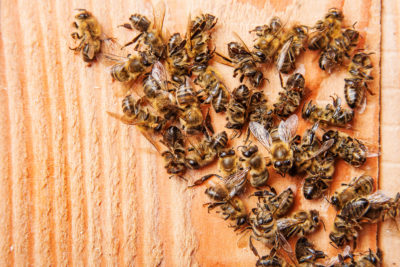|
Listen To The Article
|

Scientists still don’t know what is causing the massive insect loss or “bugpocalypse” around the world.
A massive insect loss threatens to devastate the environment and the world’s food supply. It worries scientists because huge numbers of bugs are dying off around the world.
For instance, 76% of flying insects in German nature preserves disappeared. Significantly, flying insects such as bees and butterflies pollinate food crops.
Butterflies have vanished from the El Yunque National Forest in Puerto Rico, biologist Bradford Lister reports. Lister visited El Yunque in the 1970s and also in 2018 to count bugs.
The number of insects in El Yunque fell by 45% in 40 years, Lister estimates. “Everything is dropping,” Lister said of El Yunque.
Massive Insect Loss Obliterates Food Web
Notably, Lister’s research shows that the “food web” in El Yunque has been “obliterated from the bottom,” The Washington Post reports.
Birds, lizards, and other animals that eat insects are disappearing fast because of the massive insect loss. For example, the population of a bird called the Puerto Rican Tody, which eats bugs, fell by 90%.
Additionally, the number of insect-eating frogs fell by 50% and some species of lizards have disappeared. Lister and a colleague counted insects and animals by capturing them.
Massive Insect Loss Threatens Human Food Supply
The massive insect loss threatens your family’s food supply because insects pollinate crops. Specifically, 35% of the world’s plants require pollination by flying insects.
The situation also threatens many pollinator species with extinction, a United Nations report explains. David Wagner of the University of Connecticut calls recent studies on insect loss a “wake-up call.”
“This is one of the most disturbing articles I have ever read,” Wagner, an expert in insect conservation, warns.
Scientists Do Not Know What Is Causing The Massive Insect Loss
“One of the scariest parts about it is that we don’t have an obvious smoking gun here,” Wagner admits.
The scientists, notably, do not know what is causing the massive insect loss or “bugpocalypse.” For example, some scientists blame climate change while others believe insecticides are to blame. Other probable causes include droughts, destruction of the environment, and factory farms.
Massive Insect Loss Will Make World Dirtier
Moreover, the massive insect loss will increase the amount of disease in the world. To explain, insects eat animal carcasses, garbage, and rotting wood.
The threat of disease will rise because there will be more garbage and dead animals around. Consequently, the world will be a smellier place thanks to all that rotting wood and flesh. Scientists also believe that even greater catastrophes will result from the massive insect loss.
“If the tropical forests go it will be yet another catastrophic failure of the whole Earth system,” Lister warns. “That will feedback on human beings in an almost unimaginable way.”
You may also enjoy reading an additional Off The Grid News article: Honey Bees Dying? You Can Help By Starting Your Own Hive
What do you think about massive insect loss and how it may impact the food supply? Let us know in the comments below.
 Off The Grid News Better Ideas For Off The Grid Living
Off The Grid News Better Ideas For Off The Grid Living


